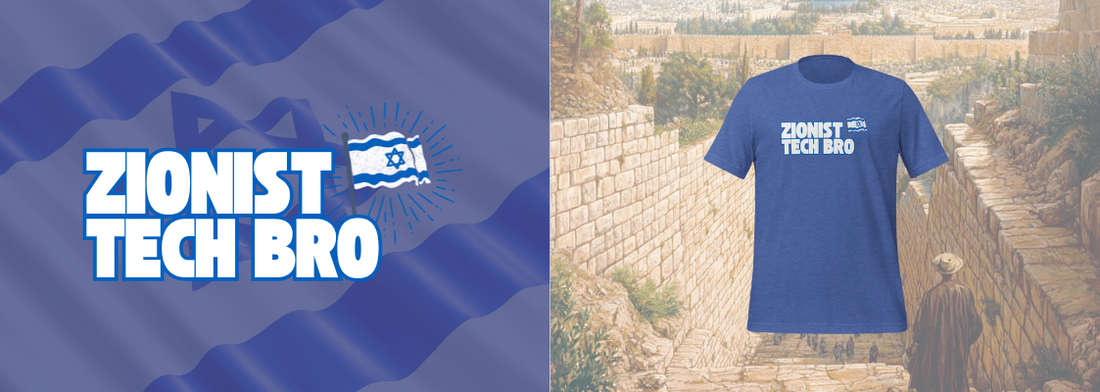
Reclaiming Zionism: The Story Behind the Zionist Tech Bro Tee
Share
What Does Zionism Really Mean?
At its core, Zionism is the Jewish people’s connection to the land of Israel, a movement grounded in our history, culture, and faith. The term comes from “Zion,” a Biblical name for Jerusalem and, by extension, all of Israel. For millennia, Jews have longed to return to Zion, as expressed in prayers, scriptures, and holidays. This connection is not just historical but spiritual, deeply intertwined with our Jewish identity.
The Bible itself is filled with references to Israel as the ancestral homeland of the Jewish people. In Genesis, God promises Abraham, “To your offspring, I will give this land” (Genesis 12:7). Later, the prophets speak of the Jewish people returning to Israel after exile, a longing that has been passed down for generations. Zionism, in its modern form, is the realization of that ancient dream: the establishment of a Jewish state in our ancestral homeland, where Jews can live freely, independently, and with dignity.
Modern Zionism, as envisioned by Theodor Herzl, is rooted in the idea that the Jewish people needed a national home of their own, where they could live without fear of persecution. Herzl famously said, “If you will it, it is no dream.” His vision set the stage for the creation of the State of Israel in 1948, a historic moment that continues to resonate with Jews worldwide.
Zionism and Antisemitism: A Dangerous Misappropriation
Sadly, the word Zionism has been hijacked in recent years. What began as a movement for Jewish self-determination has often become a stand-in for antisemitism. Instead of attacking Jews directly, some now hide behind the word “Zionist” to spread age-old hatred. Anti-Zionism is antisemitism—plain and simple. Denying the Jewish people their right to self-determination is just another form of discrimination.
The statistics bear this out. A 2021 study by the Anti-Defamation League (ADL) reported a 75% rise in antisemitic incidents in the U.S. following the escalation of the Israel-Gaza conflict in May of that year, and many of these incidents were couched in anti-Zionist language. Attacks on Jews often included phrases like “Free Palestine” and “Death to Zionists,” demonstrating how antisemitism frequently disguises itself as opposition to Israel.
Furthermore, in a 2020 American Jewish Committee (AJC) survey, 85% of American Jews agreed that anti-Zionism is a form of antisemitism, and 82% reported that they feel less secure in the U.S. than in previous years due to rising hostility toward both Israel and Jews.
Globally, The Kantor Center’s Report on Antisemitism Worldwide found that antisemitic acts increased by 30% in 2022 compared to the previous year, with much of the hostility being tied to anti-Zionist rhetoric. In Europe, the line between criticism of Israeli policy and antisemitic attacks has become increasingly blurred. In countries like France and Germany, physical assaults on Jews, vandalism of synagogues, and anti-Zionist slogans at protests are frequent manifestations of this dangerous trend.
For too long, we’ve seen “Zionist” weaponized to justify attacks on Jews and Israel. From university campuses to social media, people who claim to oppose Zionism are often found peddling the same tropes that have been used to marginalize and persecute Jews for centuries. It’s time to call out this hypocrisy and reclaim the true meaning of Zionism: a legitimate, positive movement for Jewish self-determination.
The Birth of the Zionist Tech Bro Tee
The story behind this shirt is personal. In the summer of 2023, I attended a tech conference, one I had never missed in over a decade. During the event, someone referred to me as a “Zionist Tech Bro” because my friendship with someone from the Middle East was perceived as threatening by someone who didn’t know either of us. At the time, I laughed it off as a whimsical new nickname, because I’ve always been proud to be a Zionist. But after the tragic events of October 7, when Israel was attacked in a horrific war, I realized that it had been intended as a slur.
It struck me how casually people throw around terms like “Zionist” in a derogatory way, without understanding the pride and history that word holds. When I look at my role in tech, I see innovation and creativity. And when I look at Zionism, I see my Jewish heritage, my love for Israel, and the deep-rooted belief in a Jewish homeland. To have both identities used against me was eye-opening. After twelve years of attending that conference, I didn’t go back the following year.
That experience inspired me to create the “Zionist Tech Bro” shirt. I wanted to reclaim the term “Zionist” from those who think they can use it as something negative. This shirt is more than just a piece of clothing—it’s a statement. It says that we refuse to let others define us or shame us for standing with Israel and being proud of who we are. It’s time to own our identity and wear it proudly.
The Jewish Connection to Israel: A Timeline of Presence and Power
The Jewish connection to Israel goes back thousands of years, long before any of the more recent invaders took control of the land. The Jewish people were the original inhabitants, with a deep and unbroken bond to this land that can be traced back to Biblical times.
-
Biblical Era (c. 1500 BCE): The Jewish people settled in the land of Israel, led by figures such as Abraham, Isaac, Jacob, Moses, and Joshua. It was during this time that Jerusalem became the spiritual center of the Jewish people, with the construction of the First Temple under King Solomon around 957 BCE.
-
Babylonians (586 BCE): The Babylonian Empire, under King Nebuchadnezzar, destroyed the First Temple and exiled many Jews, though some remained in the land.
-
Persians (538 BCE): After conquering Babylon, the Persian Empire allowed Jews to return to Israel and rebuild the Second Temple in Jerusalem.
-
Greeks (332 BCE): Alexander the Great’s conquests brought Israel under Greek control, which led to the rise of Hellenism. The Jewish people fought for their autonomy, resulting in the Maccabean Revolt (167-160 BCE) and the establishment of an independent Jewish state for about a century.
-
Romans (63 BCE - 313 CE): The Roman Empire conquered Israel, leading to the destruction of the Second Temple in 70 CE and the widespread exile of Jews. The Romans renamed the land “Palestina” in an attempt to erase its Jewish identity.
-
Byzantine Empire (313 - 636 CE): After the fall of the Roman Empire, the Byzantine Empire ruled the land.
-
Arab Caliphates (636 - 1099 CE): The land was conquered by Muslim forces during the Arab expansion following the rise of Islam.
-
Crusaders (1099 - 1291 CE): European Christian forces invaded and ruled parts of Israel during the Crusades.
-
Mamluks (1291 - 1517 CE): A Muslim dynasty originating in Egypt that took control after the Crusaders.
-
Ottoman Empire (1517 - 1917 CE): The Ottomans ruled the land for 400 years, with many different peoples living there, including Jews, Arabs, and Christians.
- British Mandate (1917 - 1948 CE): After World War I, the British governed the land under a mandate from the League of Nations, which recognized the need for a Jewish homeland.
Throughout these periods of conquest, the Jewish presence in Israel never fully ceased. Jews remained connected to the land both physically and spiritually, maintaining a continuous presence despite the many foreign powers that occupied it. The establishment of the modern state of Israel in 1948 was the fulfillment of a millennia-old dream of return and self-determination.
As Golda Meir once said, “We only want that which is given naturally to all peoples of the world: to be masters of our own fate, not of others’.” This sentiment perfectly captures the essence of Zionism—self-determination for the Jewish people in their ancestral homeland.
This shirt represents a bold stand for Zionism, Israel, and the Jewish people. Let’s continue to celebrate our heritage, protect our right to self-determination, and stop allowing others to distort what Zionism truly means.












